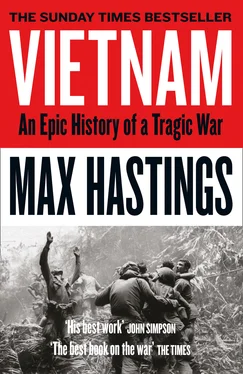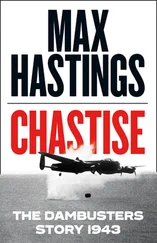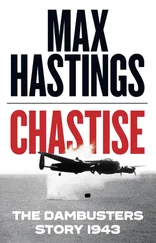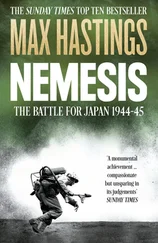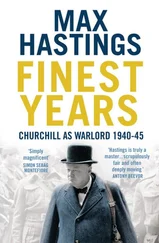There has been speculation about how much Giap’s success owed to his Chinese advisers. Mao’s men obviously provided technical instruction. For the most part, however, subsequent history shows that the North Vietnamese – as we might now begin to describe them, though many communist leaders came from the south and centre of the country – needed and accepted remarkably little guidance from others. A decade’s experience of war had made Giap and his comrades proficient, even inspired soldiers, fortified by the indifference to casualties common to all communist armies: foreign admirers later dubbed the North Vietnamese ‘Prussians of the Orient’. Hanoi’s histories pay effusive tribute to the personal role of Ho Chi Minh. Such claims are rooted in the demands of an authoritarian state’s official legend. Yet thus far, at least, they must be valid: Giap could not have accomplished what he did, nor survived so many bloody setbacks as commander-in-chief, without the support of Ho in good times and bad. The general himself was hugely respected, but his egotism made him little loved. In his subsequent writings about the battle, and indeed Vietnam’s wars, he tells a story of Giap, Giap, Giap, with scarcely a nod to the contributions of his subordinates. Nonetheless his victory at Dienbienphu stands as one of the military epics of the twentieth century.
News of the capitulation was broadcast in Paris at 4.45 p.m. on 7 May, and acknowledged in Geneva somewhat later, just hours before the assembled foreign ministers began to debate the political future of Vietnam. Georges Bidault, making the announcement, paid implausible tribute to France’s ‘civilising’ role in Vietnam, speaking of ‘this conflict that was forced upon us’. What was extraordinary about subsequent events at the conference tables – Dulles refused to sit at a common board with the Chinese – was that French humiliation yielded no triumph for the Vietminh. After expending torrents of blood to strengthen their negotiating position, they were eventually obliged to go home with half a loaf. How so?
The Geneva story began with the arrival of the first delegations, on 24 April 1954. Representatives of the world’s media thronged around the two-hundred-strong Chinese group, led by the urbane, handsome, supremely sophisticated Zhou Enlai, fifty-six-year-old scion of a scholarly family. Zhou bore to his grave the respect of the international community, despite serving as Mao Zedong’s instrument through decades of mass murder. The Russians arrived bearing a large consignment of caviar with which to enrich their hospitality at the multilateral feasts they intended to hold, though none eventually took place. John Foster Dulles sustained his usual standard of diplomatic courtesy, turning his back on Zhou when the Chinese extended a hand. The British were far more nervous of the US secretary of state than of the communists: they feared that Dulles’ rancour might provoke him to sabotage the proceedings. The obvious dominance of China and Russia reinforced the American conviction that Ho Chi Minh was their pawn: at Geneva the delegations of Zhou and Molotov were seen everywhere, that of the Vietminh only in conference sessions.
As the disparate national groups dispersed to their various hotels and mansions, Dulles led the only party stubbornly anxious to sustain the Indochina war. He expressed disgust that he had been invited to attend a diplomatic sell-out to the communists, comparable with that at Yalta in 1945. The veteran liberal columnist Walter Lippmann observed: ‘The American position at Geneva is an impossible one, so long as the leading Republican senators have no terms of peace except unconditional surrender of the enemy and no terms for entering the war except as a collective action in which nobody is now willing to engage.’
Yet the obduracy of the US secretary of state played a critical role in producing a settlement far less favourable to the communists than their victory at Dienbienphu made likely. In 1972, President Richard Nixon would fail in an attempt to convince the North Vietnamese that he was reckless enough to commit any military excess – the ‘Madman Theory’. Yet in 1954, common to all the communist delegations at Geneva was morbid dread of an American troop commitment in Asia. The Chinese and Russians had enjoyed the Korean war even less than did the Western Powers. They read newspapers, and were acutely conscious of the conservative forces in play within the US. They knew that the Eisenhower administration needed scant further provocation to commit American firepower – just conceivably, nuclear weapons. Moreover, though the Vietminh were often hailed as possessing an infinite capacity for sacrifice, by May 1954 the leadership knew that its followers were weary. Vietnam’s ‘liberated zones’ groaned under the stresses of fighting a war while simultaneously implementing a social revolution.
The word ‘partition’ seems to have crossed Russian lips before anyone else’s. The Vietminh dominated the north, while remaining weak in the south. Korea’s division at the 38th Parallel, insouciantly mandated by Dean Rusk in 1945, set a precedent. On 3 May, before the formal Vietnam sessions opened in Geneva, Bao Dai’s pantomime government threatened to boycott the conference without a French guarantee that partition was not on the agenda. That same day, Dulles returned to Washington to sulk, leaving deputy secretary Walter Bedell Smith, Eisenhower’s wartime chief of staff, to lead the American team. Everybody heaved a sigh of relief, because ‘Beadle’ was rational, as Dulles was not. A flurry of private bilateral conversations followed, involving all the delegations, before formal proceedings began on 8 May, beneath the shadow of Dienbienphu’s fall.
For the first week, the Chinese remained almost mute: the only two foreign ministers who displayed impatience were Eden and Molotov. On 10 May Pham Van Dong made an opening statement, proclaiming the Vietminh’s commitment to full independence for all three states of Indochina. He promised that those Vietnamese who had fought against Ho Chi Minh would be ‘free from repression’. Then, to the amazement of the Westerners, he expressed willingness to consider partition. It seems almost certain that the Vietminh had been heavily pressured by the Chinese and Russians to initiate such a proposal.
Once the communist camp had tabled it, this outcome became overwhelmingly likely, though much horse-trading was bound to follow about where a line should be drawn between a new North and South Vietnam. The French initially favoured a ‘leopard-skin’ distribution of territory, identifying regions that should be conceded to the communists, with the special objective of excluding Hanoi and Haiphong. On 12 May, Bao Dai’s delegation reasserted its rejection of any divide. Yet bilateral staff conversations about ways and means began between French and Vietminh representatives, encouraged by the British.
In the US Dulles made plain his own alienation, and conservative media whipped up a frenzy. Time said that Britain’s leaders ‘look alarmingly like appeasers’. Bedell Smith told a press conference that partition was unacceptable, and in private became increasingly irked by Eden’s apparent eagerness to indulge communist aspirations. In secret bilateral talks, Washington sought to stiffen Paris’s resistance, but the French responded that only immediate US military action could dissuade them from cutting a deal. Once again, Eisenhower and Dulles explored the possibilities of forging a coalition for military action even without the British. However, Australia and New Zealand declined to participate, which snuffed out that final flurry of American enthusiasm for belligerence. The Spectator described the early talks at Geneva as ‘an appalling mess’, and none of the participants disagreed.
Читать дальше
